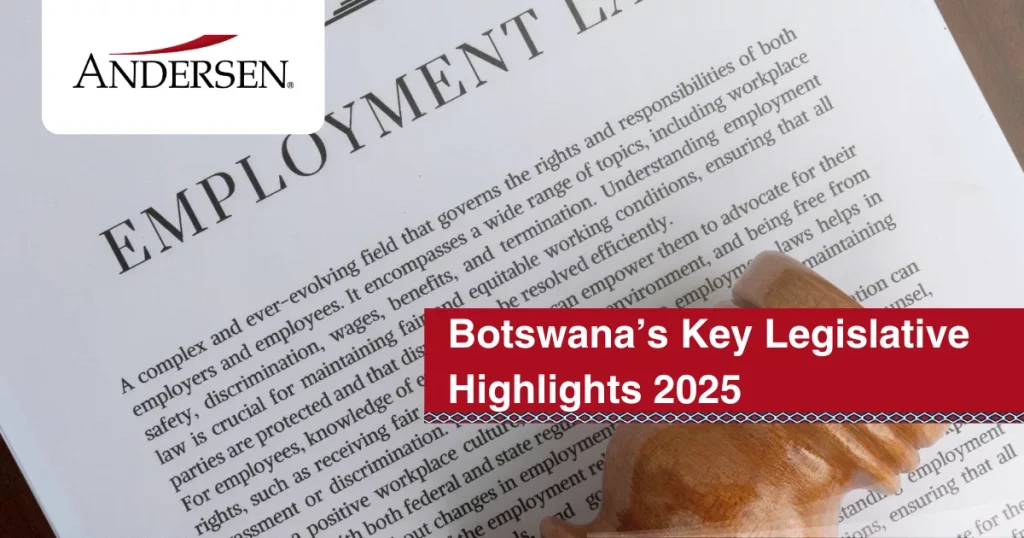To date, Botswana’s employment law has been constituted from the The Employment Act, The Trade Unions and Employer’s Organisation Act, and The Trade Disputes Act. The new Bill will consolidate all three laws for a more comprehensive outline of the law.
Substantial changes mentioned in the government gazette, published in June 2025, include the following:
Fixed-Term Contracts and Probation
The Bill imposes tighter controls:
- Probation (Section 155): Limited to six months, with extensions allowed only under specific conditions. Termination during probation requires prior feedback and support.
- Fixed-Term Contracts (Section 157): Capped at 12 months unless objectively justified. Equal treatment with permanent staff is mandated, and unjustified renewals may result in automatic conversion to indefinite contracts.
Enhanced Leave Entitlements
New provisions include:
- Maternity Leave (Section 222): Extended from 12 to 14 weeks with 70% pay.
- Paternity Leave (Section 227): Five days, with additional leave if the mother is incapacitated.
- Adoption Leave (Section 226): Ten weeks for adopting children under the age of two.
- Hospitalisation Leave (Section 220): 20 days, separate from sick leave. These changes require updates to payroll systems and leave planning strategies.
Fair Termination and Dismissal
The new Bill protection is expanded and clarifies dismissal procedures:
- Unfair Dismissal: Includes maternity, union activity, and discrimination.
- Retrenchments: Must involve consultation.
- Constructive Dismissal: Now formally recognised.
- Fair disciplinary processes before dismissal: Employers must document reasons for termination and follow fair disciplinary processes to avoid legal risks.
Employment Status Redefined
Section 151 introduces a presumption of employment for individuals under conditions of control and dependency—even if labeled as contractors. This change affects consultants, agents, and other non-traditional workers, who may now qualify as employees under the law.
Anti-Discrimination and Harassment
The Bill expands protections to include sex, disability, health status, sexual orientation, pregnancy, and political opinion. Harassment, including sexual harassment, is explicitly prohibited. Employers must implement diversity policies, train staff, and establish complaint procedures.
Strengthened Labour Inspections
Section 35 empowers labour officers to inspect workplaces and demand employment records. Officers may question employers and employees. Non-compliance is now an offence, and businesses should expect more frequent audits.
Streamlined Dispute Resolution
A new Mediation and Arbitration Commission replaces fragmented dispute bodies (i.e., District Labour Offices and the Industrial Court), offering faster resolution but stronger enforcement. Employers should prepare for early mediation and proactive settlement strategies.
Collective Bargaining and Industrial Action
Union rights are now embedded within the employment statute, providing a structured approach to recognition, bargaining, and industrial action. Businesses must engage more and follow formal procedures and engage in regulated negotiations.
Preparing for the Future
The Employment and Labour Relations Bill marks a transformative shift in Botswana’s labour environment. While it introduces new compliance obligations, it also offers clarity and consistency. Employers are encouraged to:
- Reassess contractor relationships.
- Update HR policies and employment contracts.
- Implement anti-harassment and diversity frameworks.
- Prepare for structured union engagement and inspections where applicable.
Final Words
This reform is more than legislative housekeeping—it’s a strategic overhaul designed to foster fair, transparent, and sustainable employment practices. Although this Bill has not been enforced, we do believe some changes are imminent. Businesses that act swiftly to align with the new law will not only mitigate risks but also contribute to a more equitable and resilient workforce in Botswana.
ACT NOW: Ensure Your Business is Compliant and Future-Ready.
Don’t let the complex changes to statutory leave and PAYE calculations disrupt your operations. The new requirements for Maternity, Paternity, and Hospitalisation Leave demand that your current payroll systems and processes are updated now to ensure flawless compliance and timely, accurate payment processing
Contact us today for payroll.
- Email: info@bw.Andersen.com
- Phone: +267 3951236 (Gaborone)
- Learn more about our services at: https://bw.Andersen.com


